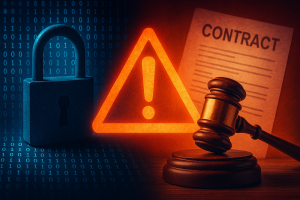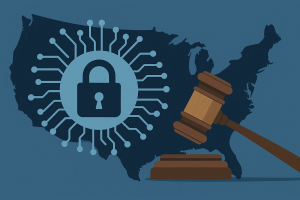July 24, 2025
The DOJ Is Cracking Down — Are You Actually Compliant?
Could a wrong checkbox on your SPRS score cost your company millions?
It's already happened — to Raytheon, Verizon, and Penn State.
Now the DOJ is cracking down, and contractors are getting sued — even if they're "almost" compliant.
Over the past few years, the DOJ has recovered more than $28 million from contractors who misrepresented their adherence to NIST SP 800-171 — and the pressure is only ramping up.
Not sure if your SPRS score would hold up under scrutiny?
Get our free CMMC Checklist
Recent Enforcement Highlights:
-
Raytheon & Nightwing Group (2025):
Fined $8.4 million for falsely claiming NIST 800-171 compliance across ~30 DoD contracts. Nightwing was penalized even though it inherited the violations through acquisition. -
MORSECORP (2025):
Paid $4.6 million after inflating their SPRS score and failing to correct it when flagged by a third-party assessment. -
Penn State University (2024):
Fined $1.25 million after a whistleblower exposed cybersecurity failures within its Applied Research Lab. Even universities are being scrutinized. -
Insight Global (2024):
Paid $2.7 million for mishandling sensitive health data on a state contract — despite claiming to meet federal cybersecurity requirements. -
Verizon (2023):
Settled for $4 million due to federal contract security failures after misrepresenting compliance with IT security obligations. -
Georgia Tech Research Corp (2024, ongoing):
Under active DOJ investigation for failing to implement required NIST 800-171 controls — and allegedly retaliating against internal whistleblowers.
These aren't isolated incidents — they represent a systematic wave of enforcement.
Just in 2024, the DOJ resolved six cyber-related False Claims Act (FCA) cases, with more underway in 2025.
What This Means for You
Let's be blunt:
-
If you're not fully compliant, but you're claiming you are — you're at risk.
-
If you're a subcontractor "checking the box" to stay competitive — you could expose your entire company to litigation.
-
If you're waiting to take CMMC seriously, you're already behind.
CMMC is no longer theoretical.
-
Title 48 has embedded it into federal acquisition law.
-
32 CFR is live.
-
Primes are already flowing down requirements.
-
And the DOJ isn't just warning — it's suing.
Don't Let a False Claim Be Your Most Expensive Mistake
Saying you're compliant when you're not — even if you're "almost there" — could cost you millions and threaten your eligibility for future contracts.
What You Should Do Now
If you're unsure where your organization really stands — or you want a plan that holds up under real-world scrutiny — now is the time to act.
-
We'll help you assess where you are
-
Create a defensible POA&M
-
And build a path to compliance that's technically sound, operationally realistic, and legally safe
Our door is open.
Let's have a conversation — before the DOJ has one with you.
References
-
Arnold & Porter. (2025, April). Civil Cyber-Fraud Initiative strikes again.Link
-
Taxpayers Against Fraud. (2024). False Claims in cybersecurity enforcement update.Link
-
Clark Hill. (2025). Key lessons from Raytheon's $8.4 million FCA settlement.Link
-
Inside Government Contracts. (2024). Penn State settles FCA cybersecurity case.Link








